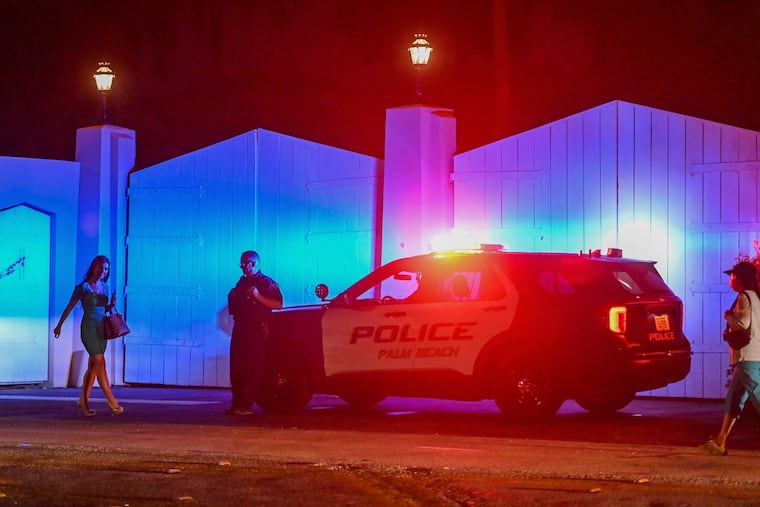The raid on Trump’s house could set a dangerous precedent
A nation can move pretty quickly from one where no ex-president has ever gone to jail to one where every ex-president goes to jail. That's a dark path for a republic.

The FBI raid on former president Donald Trump’s Florida home forces into the foreground several norms of American culture that, at times, contradict.
We have the idea that all criminals, no matter their social status, should answer for their crimes in court. But we also have the custom — separating us from many failed republics — that politicians should not use the justice system to punish their political enemies. Both of these norms have frayed in recent years; now, they threaten to fall apart completely.
The offense of which Trump is accused involves the Presidential Records Act, which requires the preservation of presidential documents. Allegedly, 15 boxes of presidential records ended up at Trump’s property in Mar-a-Lago, instead of the National Archives, where they belonged. If he may have broken the law, shouldn’t he be investigated? To say that he should not, simply because he once held high office, suggests a double standard, a separate set of rules for the rich and powerful. That answer cannot be satisfying to the American people.
» READ MORE: Hey, Trump GOPers, we don’t have to imagine what cops can do to everyday citizens
But at the same time, when the Department of Justice under Joe Biden takes up the flag of “lock him up” against Biden’s 2020 opponent, it is not conspiratorial to question the motivation. Biden’s press secretary, Karine Jean-Pierre, says that the DOJ “conducts investigations independently and we leave any law enforcement matters to them.” No one at the White House “was given a heads up” about what happened on Aug. 8 at Mar-a-Lago, she also said.
But where was the decision made? How high up the chain of command did the discussion reach? If the buck does not stop with Biden, where does it stop? On Thursday, Attorney General Merrick Garland told the press that he personally approved the search warrant. That makes sense. When the FBI wanted to tap Martin Luther King Jr.’s phones in 1963, it required the attorney general — Robert F. Kennedy — to approve the action (which he did). But did Biden know, or just his AG?
The question is important. Transparency is vital. If the people can see that Trump’s actions were so egregious as to require discarding a long-standing norm, then the action becomes more acceptable. And if they know who else knew of and approved the action, they can judge for themselves whether the decision-making was impartial.
As it stands now, even some who are unfriendly to Trump question the raid. Former New York governor Andrew Cuomo tweeted, “DOJ must immediately explain the reason for its raid & it must be more than a search for inconsequential archives or it will be viewed as a political tactic and undermine any future credible investigation & legitimacy of January 6 investigations.” Andrew Yang thought the raid would likely backfire on the administration. “It looks increasingly like the FBI raid was to find mishandled classified documents and not some other DOJ investigation which was my first thought,” he wrote on Twitter the following day. “Mishandling documents doesn’t seem like raid material. It does however seem like excellent campaign material for Trump.”
“Even some who are unfriendly to Trump question the raid.”
How it looks politically is less important than what it actually is, but when we talk about trust in our nation’s institutions, we are talking about both perception and reality. For the justice system to be trusted, it must be fair and impartial, and it must be seen to be fair and impartial.
The solution should be one familiar to us for the past 50 years: the appointment of a special counsel. If Trump’s crimes are serious, the implications of that mean that they must be elevated from the ordinary level of bureaucracy and into the hands of someone better equipped to weigh all of the factors. The special counsel is also more isolated from political pressures in the way that Garland and other high-ranking DOJ political appointees are not and can thereby avoid conflicts of interest.
Is mismanagement of records enough to justify all that? We cannot say for sure without getting more of the facts from DOJ. The warrant is now unsealed — a good first step — but many more questions remain about what led the DOJ to take such drastic action.
The Mar-a-Lago raid raised the temperature in an already boiling political climate. Not everyone reading this will be willing to extend a great deal of sympathy to Donald Trump — fair enough. But if Trump’s toppling of norms bothered you, this raid should, too.
If this becomes the normal course of affairs, do not be surprised when the next Republican attorney general authorizes a raid on Biden’s house to investigate any number of plausible allegations involving Biden’s son Hunter. The same justifications would apply, and partisans would quickly reverse their previous positions to protect their own side.
A nation can move pretty quickly from one where no ex-president has ever gone to jail to one where every ex-president goes to jail. That’s a dark path for a republic, and one America has managed to avoid until now.
Kyle Sammin is editor-at-large at Broad + Liberty.